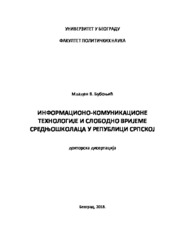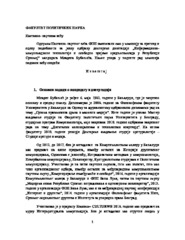Приказ основних података о дисертацији
Информационо-комуникационе технологије и слободно вријеме средњошколаца у Републици Српској
Information and communication technologies and leisure of high school students in Republika Srpska
| dc.contributor.advisor | Radojković, Miroljub | |
| dc.contributor.other | Petrović, Dalibor | |
| dc.contributor.other | Milojević, Ana | |
| dc.creator | Bubonjić, Mladen V. | |
| dc.date.accessioned | 2018-11-07T15:58:33Z | |
| dc.date.available | 2018-11-07T15:58:33Z | |
| dc.date.available | 2020-07-03T09:43:13Z | |
| dc.date.issued | 2018-09-12 | |
| dc.identifier.uri | http://eteze.bg.ac.rs/application/showtheses?thesesId=6089 | |
| dc.identifier.uri | https://nardus.mpn.gov.rs/handle/123456789/10102 | |
| dc.identifier.uri | https://fedorabg.bg.ac.rs/fedora/get/o:18497/bdef:Content/download | |
| dc.identifier.uri | http://vbs.rs/scripts/cobiss?command=DISPLAY&base=70036&RID=518300503 | |
| dc.description.abstract | Предмет овог рада је емпиријско истраживање да ли и на који начин информационо-комуникационе технологије утичу на слободно вријеме средњошколаца у Републици Српској. Прецизније, да ли и на који начин аспекти информационо-комуникационих технологија утичу на млађе генерације да своје слободно вријеме упражњавају на другачији начин од оног који је био предоминантан код старијих генерација. Кроз разговор са испитаницима у фокус групама настојало се одговорити на основна истраживачка питања: Како се у новом животном стилу тумачи постојање слободног времена и схватање младих о њему? Да ли човјек, конкретније млади, контролишу виртуелни свијет или он контролише њих? Да ли млади грађу за конструкцију симболичке реалности узимају из својих „гаџета“? Из ког разлога „дигиталне генерације“, које у постмодерни чине посебну поткултуру, прибјегавају социјалним интеракцијама путем „онлајн“ друштвених мрежа? На који начин нове информационо-комуникационе технологије утичу на слободно вријеме младих? Да ли су и које карактеристике информационо-комуникационих технологија привукле млађе кориснике и увећале свој удио у њиховом слободном времену? Један од циљева овог рада јесте покушај да се открије да ли се кориштење информационо-комуникационих технологија намеће као рационалан избор зато што алтернативе, према схватању младих, нису сврсисходне и не пружају адекватан одговор на оно што ствара преференције младих, а то је, прије свега, друштвено-технолошки развој. Истраживање је било усмјерено ка томе да установи да ли информационо-комуникационе технологије младима пружају оно што они очекују од њих када је ријеч о кориштењу у слободном времену, прије свега, шта за њих значи слободно вријеме и како га проводе – према њиховом мишљењу сврсисходно или 5 мање сврсисходно. Ово је важно зато што пружа увид у то како млади перципирају виртуелне друштвене мреже, интернет уопште – као „мјесто“ за развој и сврсисходно кориштење или простор да се „убије вријеме“... | sr |
| dc.description.abstract | The subject of this paper is an empirical research on whether and how information and communication technologies affect the leisure of high school students in Republika Srpska. More specifically, whether and how aspects of information and communication technologies affect younger generations to exercise their leisure in a different way than that which was prevalent in older generations. Through interviews with respondents in focus groups, the goal was to answer to basic research questions: How does the new lifestyle interpret the existence of leisure time and the perception of young people about it? Does a man, more specifically a youth, control a virtual world or does the wirtual world control them? Do young people take out their „gadget“ for the construction of symbolic reality? For what reason are the „digital generations“, which in postmodernism make a special subculture, resort to social interactions through „online“ social networks? How do new information and communication technologies affect young people's leisure time? Are they and which characteristics of information and communication technologies attracted younger users and increased their share in their leisure? One of the goals of this paper is an attempt to discover whether the use of information and communication technologies is imposed as a rational choice because alternatives, according to the youth, are not appropriate and do not provide an adequate response to that what creates youth preferences, which is, above all, socio-technological development. The research was aimed at determining whether information and communication technologies provide young people with that what they expect from them when it comes to using in leisure, first of all, what leisure means to them and how they spend it – in their opinion, is it worthwhile or less purposeful. This is important because it provides insight into how young people perceive virtual social networks, the Internet at all – as a „place“ for development and purpose-oriented use or a space to „kill the time“. 8 The basic hypothesis of this work is that ICTs significantly influence the leisure of high school students in Republika Srpska who using these technologies do not have their leisure, but „give it“ to them. By examining the main hypothesis, it has been found that young people show duplication of feelings towards digital technologies. Although they often have negative attitudes, especially for social networks, the general tendency is they are massively use the social networks, often for reasons that do not have a higher goal. Using digital technologies, in particular social networks, young people essentially lose time, but they can not resist their „seduction“. Although they believe that social networks can also have positive aspects, in terms of communicating with distant friends or relatives, gathering information that can be used in a more meaningful way, respondents have stated that they use digital information and communication technologies more for entertainment, whatever they understand it, and wasting time... | en |
| dc.format | application/pdf | |
| dc.language | sr | |
| dc.publisher | Универзитет у Београду, Факултет политичких наука | sr |
| dc.rights | openAccess | en |
| dc.rights.uri | https://creativecommons.org/licenses/by-nc/4.0/ | |
| dc.source | Универзитет у Београду | sr |
| dc.subject | информационо-комуникационе технологије | sr |
| dc.subject | information and communication technologies | en |
| dc.subject | leisure | en |
| dc.subject | digital natives | en |
| dc.subject | networking | en |
| dc.subject | sociability | en |
| dc.subject | digital knowledge | en |
| dc.subject | generation gap | en |
| dc.subject | nomophobia | en |
| dc.subject | conformism | en |
| dc.subject | слободно вријеме | sr |
| dc.subject | дигитални урођеници | sr |
| dc.subject | умреженост | sr |
| dc.subject | друштвеност | sr |
| dc.subject | дигитално знање | sr |
| dc.subject | генерацијски јаз | sr |
| dc.subject | номофобија | sr |
| dc.subject | конформизам | sr |
| dc.title | Информационо-комуникационе технологије и слободно вријеме средњошколаца у Републици Српској | sr |
| dc.title.alternative | Information and communication technologies and leisure of high school students in Republika Srpska | en |
| dc.type | doctoralThesis | en |
| dc.rights.license | BY-NC | |
| dcterms.abstract | Радојковић, Мирољуб; Милојевић, Aна; Петровић, Далибор; Бубоњић, Младен В.; Informaciono-komunikacione tehnologije i slobodno vrijeme srednjoškolaca u Republici Srpskoj; | |
| dc.identifier.fulltext | http://nardus.mpn.gov.rs/bitstream/id/23068/Disertacija.pdf | |
| dc.identifier.fulltext | http://nardus.mpn.gov.rs/bitstream/id/23069/IzvestajKomisije17862.pdf | |
| dc.identifier.fulltext | https://nardus.mpn.gov.rs/bitstream/id/23068/Disertacija.pdf | |
| dc.identifier.fulltext | https://nardus.mpn.gov.rs/bitstream/id/23069/IzvestajKomisije17862.pdf | |
| dc.identifier.rcub | https://hdl.handle.net/21.15107/rcub_nardus_10102 |



